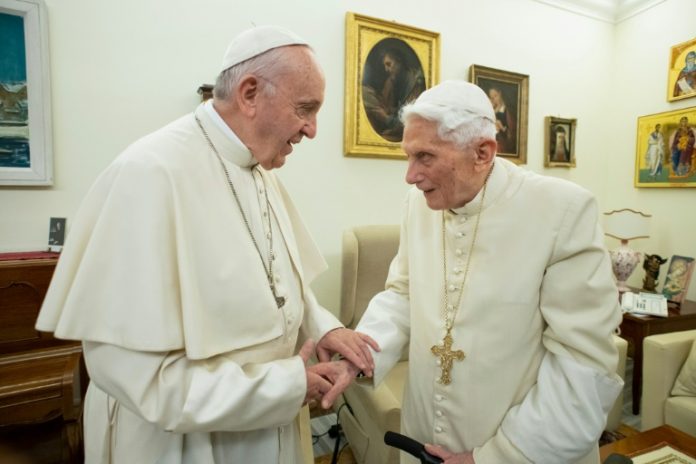Ex-pope Benedict XVI seems to have broken his silence recently over key Catholic issues and his comments have raised serious questions within the Church about the extent to which there are, in fact, two “men in white” at the Vatican
In 2013, Benedict became the first pontiff to resign in almost 600 years. He chose to be known thereafter as “pope emeritus” and said he would live “hidden from the world” in a former convent inside the Vatican grounds.
While he initially stuck to his promise to carry out a life of quiet contemplation and academic research, he has since weighed in on the explosive issues of clerical sex abuse and whether the priesthood could be opened to married men.
This week, Benedict’s contribution to a book on celibacy was seen as a strategic attempt to undermine his successor Pope Francis and boost the cause of a combative ultra-conservative wing of the Church.
Experts say the problem is that no rules were drawn up to define what role Benedict should play after he stepped down as head of the church.
“There were hints of a problem right from the start”, when Benedict gave up the papal hat but not the postal address, Richard Gaillardetz, Catholic theology professor at Boston College, told the National Catholic Reporter.

“The publication of views on controverted issues, when offered by a man who insists that he too still deserves the title ‘pope’ (albeit pope emeritus), who continues to wear papal garb and who still resides in the Vatican, is deeply problematic,” Gaillardetz said.
Even Benedict’s supporters said he should have used his given name, Joseph Ratzinger, when signing his contribution to the book.
Historian Francesco Margiotta Broglio, head of Italy’s religious freedom commission, told La Stampa that “Ratzinger should neither write nor speak.
“If he continues to go against the reigning pope, he could become an anti-pope”.
Benedict’s age and physical frailty – the 92-year old reportedly has difficulty speaking or writing – has prompted some Vatican watchers to question whether he was the author of his published reflections, or whether someone put words in his mouth.
“It seems likely some prelates opposed to Francis have sought to hide their plots in the mantle of the emeritus,” said Massimo Faggioli, theology professor at Villanova University.
The ex-pope said when he resigned that he no longer had the strength of mind or body to carry on. His personal secretary Georg Gaenswein said in 2016 that he was “slowly fading”.

Vatican expert for the Catholic weekly The Tablet, Christopher Lamb, was not the only one to point out that Archbishop Gaenswein – nicknamed “Gorgeous George” by his admirers for his dashing good looks – occupies a crucial, gatekeeper role for the ex-pope.
“Benedict’s interventions over the past year have raised questions regarding whether, given his own infirmity… he is being manipulated by persons eager to undermine the current papacy, even if Benedict himself is not,” Gaillardetz said.
Faggioli pointed out that not only was there still no Church law on how to deal with an incapacitated pope, it “evidently also needs a law concerning the situation created by an incapacitated ’emeritus’ and his entourage”.
Experts said the priority should now be to determine the role and functions of a retired pope, with some suggesting that Francis could change canon law, or set up a commission to suggest some new ground rules.
These could include either giving former bishops of Rome a new pastoral role if they are of working age, or allowing them to retire as designated bishop emeritus of Rome but insist they take off the papal regalia and live outside the Vatican.
















